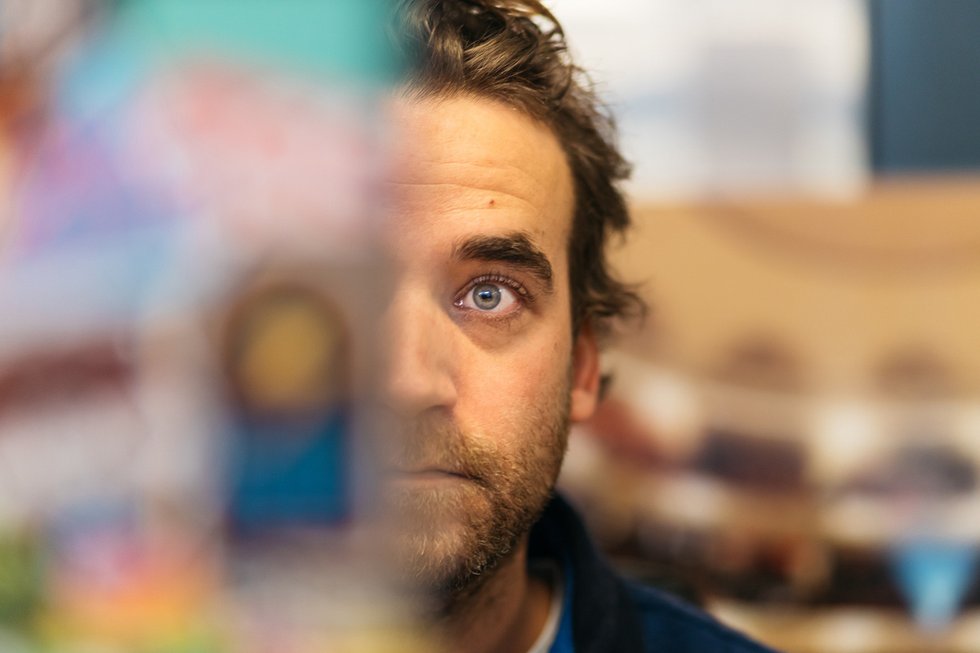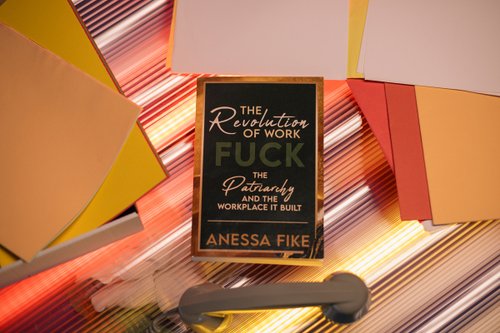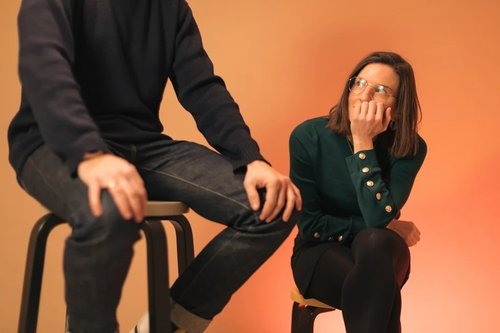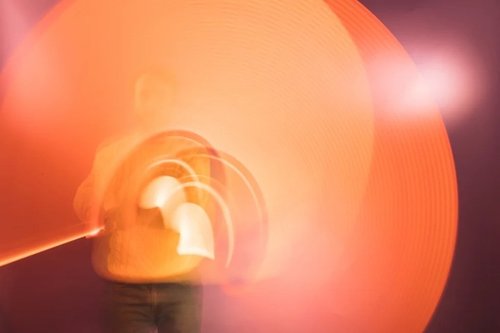"I write with my eyes"
Dec 16, 2020
5 mins


Journalist & documentary filmmaker
More than other professionals, writers rely on screen-based technology. They get ideas from online articles, jot down thoughts on countless note apps, communicate with editors through email and chat apps, and weave sentences together on Google Drive.
For Aidan Matear, a writer from Manchester, the symbiosis with these tools goes one step further. He has cerebral palsy, which means that he is unable to move or speak properly, and communicates via an eye-tracking device. His disability hasn’t stopped him from chasing his dreams of writing science fiction and becoming a motivational speaker. Here he shares his story on how eye-tracking technology has enabled him to pursue his professional future.
My name is Aidan Matear, I am 25 years old, and I live with my parents in Bolton, Greater Manchester. I am a science fiction writer, blogger, and motivational speaker. In many ways, I work like most writers, apart from the fact that I write with my eyes.
I have cerebral palsy, after being deprived of oxygen during birth which caused brain damage. People often assume that it is just my legs that don’t work because I use a wheelchair, when in fact I have virtually no motor skills at all. I can speak very slowly but my speech is dysarthric—it’s slurred and hard to understand because the muscles I use for speech are weak. So I rely on eye-tracking technology to communicate and work.
When I write I am on a level playing field. It doesn’t matter that I can’t walk. When I write I am me.
The thought of becoming a writer crept up on me as I grew up. I always loved books, first being read to as a small child and then reading by myself when I was able. Because of my disability, I couldn’t run around the playground or play football, so I had to find something I could do. Books were always there. And from reading came writing. When I write I am on a level playing field. It doesn’t matter that I can’t walk. When I write I am me.
How does it work?
The device I am using to write wasn’t always available. I used to type with one thumb on a mini iPad. It was extremely slow and tedious as my hand and wrist were not in a good position. Fatigue was a real problem because writing a short paragraph would take over an hour—and that was when I knew exactly what I wanted to write.
In 2016 I got my first Tobii eye tracker, which attached to my laptop and allowed me to use my eyes like a mouse to control it. This device allowed me to write independently and I used it extensively while studying for my degree in creative writing. The exact setup was crucial in terms of the distance between my eyes and the screen. Sometimes it was difficult to get this just right to get a good calibration and a fast response.
It’s like a cross between a computer, a tablet, and a communication device.
I’m currently using an eye-tracking device called Tobii Dynavox I-Series, which is absolutely incredible. It is easy and quick to set up, it’s fast and responsive, and can be used in sunlight. It’s like a cross between a computer, a tablet, and a communication device. I can write, do emails, make and answer calls, access social media, and switch between all of them, using my eyes.
My world as compared to other writers
This technology has had a major positive impact on my work life. I can produce more work than ever before. I can write for much longer periods without getting fatigued. I can respond to queries, and I can ask questions. I can do edits as required. I always enjoyed my work but I enjoy it even more now.
A normal working day starts with the checking of emails and deadlines that need to be met. Depending on that, I decide what I need to focus on that particular day. Much of my work is voluntary as I am building my portfolio, but that is the same for many writers when they start. My cerebral palsy means that I have frequent medical appointments so I have to work around those too.
Sometimes I think there is an advantage because although it is slower it does give me more thinking time; I am often already editing as I am writing.
I do feel that I work like most writers, who are largely communicating nonverbally through a screen. I realize that script writing, for example, would be difficult, as meeting physically with teams would be nigh on impossible, even before the pandemic. Verbal conversations are difficult because of my dysarthric speech. But communicating nonverbally works well for me.
Writing with my eyes is considerably slower than other people typing. However, as an eye-gaze user, I am very fast. The predictive text also speeds me up because the system learns what word I might want next. And I have very good eyesight so I can quickly scan and choose these words. Most importantly, writing with my eyes, even if it’s much slower, means that I can at least write. Sometimes I think there is an advantage because although it is slower it does give me more thinking time; I am often already editing as I am writing.
My working day
Often people with disabilities are portrayed as brave or inspirational, and indeed many are. **But we are also scared and grumpy some of the time.
I started my blog when I finished university in 2018. At first, it was somewhere to share my writing, poetry, and shorter fiction pieces. Now I want to use it more for sharing ideas and stories about disability awareness. Often people with disabilities are portrayed as brave or inspirational, and indeed many are. But we are also scared and grumpy some of the time. Finding information relevant to us can be very difficult, so I hope to use my blog to share ideas that will help others.
If I can use my writing or my lived experience of disability to help someone else then I will consider that a good job well done.
I was just getting underway with motivational speaking sessions when the pandemic happened. I did a few sessions at local colleges and the like, but since March it hasn’t been possible. However, I have a few sessions coming up in spring where I intend to use the speech generator part of my Tobii Dynavox to present remotely. I didn’t have that technology previously so I used a laptop to run PowerPoint and an app on my iPad, Proloquo4text. The Tobii should be better for this, I think. Everything is integrated into one device and I can control it all with my eyes.
I am driven to make the world a better place for people with disabilities. We are after all just people. We just want to have the best life we can, the same as anyone else. If I can use my writing or my lived experience of disability to help someone else then I will consider that a good job well done.
My profession is my life. In the past year, I have had several reviews published by Pencil Tip Publishing, all on science fiction. I consider myself extremely fortunate that the thing I love to do most of all is the thing that I can do. This is partly because of the practicalities of doing something else with my profound disability, but in truth, I don’t want to do anything else.
I can only say how incredibly grateful I am that I got my device when I did, literally a few weeks before lockdown. I have absolutely no idea how difficult life in lockdown would have been without this device. It has kept me busy, kept me sane, and allowed me to get on with my life from my living room.
Photo: Welcome to the Jungle
Follow Welcome to the Jungle on Facebook, LinkedIn, and Instagram, and subscribe to our newsletter to get our latest articles every day!

More inspiration: DEI

Sh*t’s broken—Here’s how we fix work for good
Built by and for a narrow few, our workplace systems are in need of a revolution.
Dec 23, 2024

What Kamala Harris’s legacy means for the future of female leadership
The US presidential elections may not have yielded triumph, but can we still count a victory for women in leadership?
Nov 06, 2024

Leadership skills: Showing confidence at work without being labeled as arrogant
While confidence is crucial, women are frequently criticized for it, often being labeled as arrogant when they display assertiveness.
Oct 22, 2024

Pathways to success: Career resources for Indigenous job hunters
Your culture is your strength! Learn how to leverage your identity to stand out in the job market, while also building a career
Oct 14, 2024

Age does matter, at work and in the White House
What we've learned from the 2024 presidential elections about aging at work.
Sep 09, 2024
The newsletter that does the job
Want to keep up with the latest articles? Twice a week you can receive stories, jobs, and tips in your inbox.

Looking for your next job?
Over 200,000 people have found a job with Welcome to the Jungle.
Explore jobs